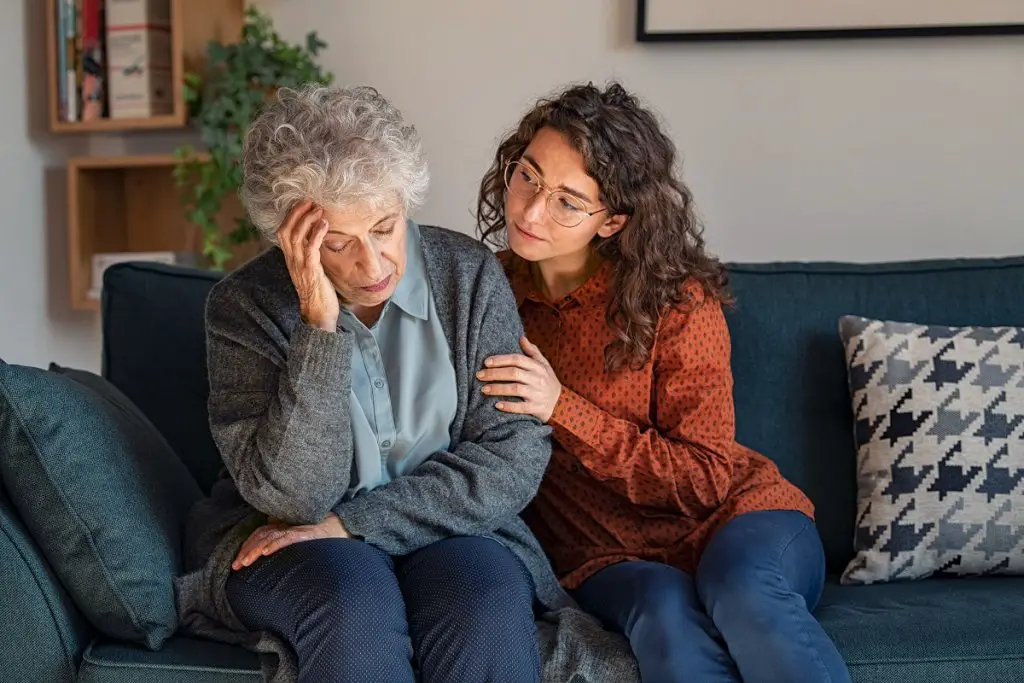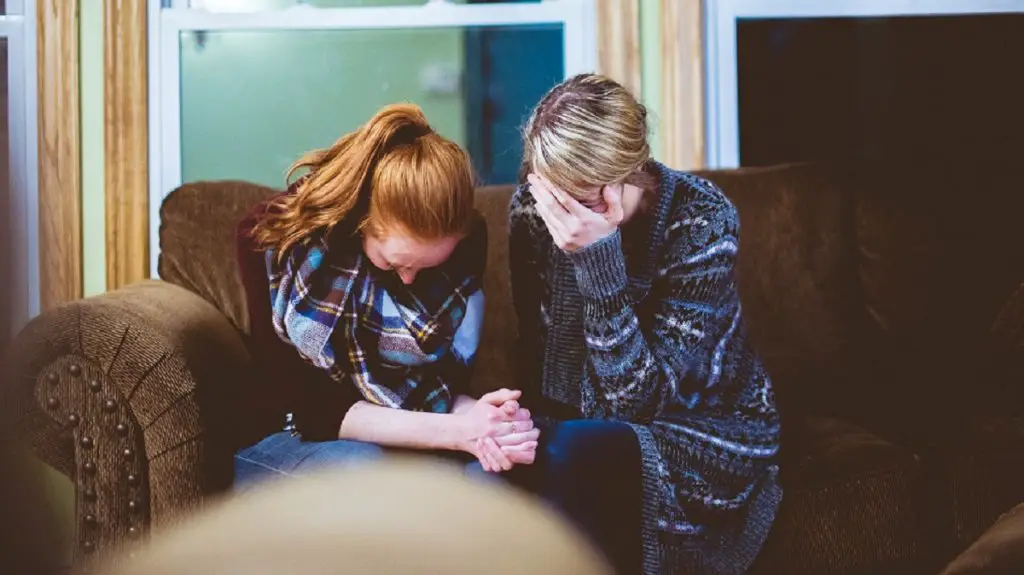When a friend or relative has a death in the family, you might wonder what to say to someone who lost a loved one. Even if you have experienced something similar, you cannot completely understand, so finding the right words is difficult. Here are some guidelines for what to say and what to avoid.
Death is scary and stressful; the emotions surrounding it are intense and all-encompassing. Words of comfort can be so important, yet people often avoid the griever because they feel uncomfortable or don’t know what to say. Other times people just pretend everything is normal.

Table of Contents
What Are Some Comforting Words To Say To Someone Who Has Lost A Loved One?
Even if expressing your condolences is difficult, there are some things you can say to someone who has lost a loved one:
“I’m so sorry you are going through this.” – Let them feel seen.
“I can’t imagine how you are feeling.” – Validate their emotions and pain. Whatever they are feeling, it’s normal and okay.
“I will miss Sam so much. The world won’t be the same without him in it.” – Let them see you cared for the departed and that they made an impact on your life.
“How are you feeling today?” – Instead of asking just a general “how are you?”, to which you will probably get a standard answer, ask them about today. It’s a process, and every day can look different from the one before. Maybe yesterday they were feeling stronger, but today things are getting on top of them, or maybe last week they were crying all the time, but today, not so often.
“I’m sorry you’re suffering” – Acknowledge the pain and suffering they are in without minimizing it or trying to find a silver lining or putting a time frame on it.
“Would you like to talk about your husband/father/son?” – Sometimes, people are reluctant to mention the deceased for fear of upsetting the griever even more. More often than not, the griever is thinking about their loved one all the time anyway and would love to talk about what they were like or reminisce about things they shared.
How Can You Express Your Sympathy In Words And Other Ways?
When you don’t see your grieving friend face-to-face, you can text or email the sentiment above. However, there are other concrete ways you can express your sympathy.
Send A Condolence Card
Sympathy messages remain popular because a condolence card is so much more personal than a text message and allows you to express yourself much better. Cards can be kept and re-read over and over again, and this is why the choice of words is so important.
However, some people just aren’t good with words. They express their sympathy through acts of goodwill and kindness. It’s the intent behind the gesture that counts.
Make A Donations To Charity
A donation to a relevant charity, research fund, hospital, or hospice can be a genuine, tangible way to show your sympathy. It’s a gesture that shows you cared about the deceased and you want to do something to help others who are in the same situation.
Offer Help And Support
Offering practical and emotional support to the bereaved in times of grief is a common way of expressing sympathy. Helping with younger children, dropping off meals and groceries, or doing the laundry are all ways of showing you care. If you are close to the bereaved, lending a hand with the funeral arrangements is a thoughtful way of showing sympathy; you are taking some stress off their minds.
Be A Safe Haven
When a death occurs, things can get very chaotic around the house for a few days. Some people need to escape the continuous stream of visitors or the constant phone calls for a while. If you live nearby, you can offer a quiet space in your home or take the griever out to lunch or for a long walk to get away from the bustle and noise.

What Should You Avoid Saying?
It’s so easy to say the wrong thing while fumbling for the right words. It’s a natural instinct to want to try and “fix” things by saying what you hope sounds comforting, but you can end up alienating the grieving person.
After you have said, “I’m sorry for your loss,” there may be a conversational gap that people often fill you with all the wrong things. It is better to conclude the conversation with some reassurance that you love the person and a promise to call next week than to stumble into unwelcome territory.
Avoid these phrases (or variations of them) while trying to offer condolences:
Silver Lining Statements
You should avoid saying anything that starts to sound like an “on the bright side” sentiment. A tell-tale sign that what you’re about to say is a “bright side” statement, is that it starts with “at least….”
“At least he/she is in a better place now.”
“At least she/he isn’t suffering anymore.”
“At least you knew it was coming, and you were prepared.”
“At least you had many years together.”
“At least it was quick and painless.”
“At least you have other children.”
“At least you weren’t as close in those final years.”
When people are grieving, most of these phrases come across as invalidating or trivializing the pain they are in. Trying to be the one who sees the “silver lining” in a death, in an attempt to lessen the grief, will only make you seem insensitive or callous. If you don’t know what to say, it’s better to stick to the more traditional condolences than to risk causing more pain due to thoughtless phrasing, even if it’s coming from a genuine desire to make someone feel better.
This is not to say that later on, when you have conversations with your bereaved best friend or close family member, some of these topics will not come up. As with many things in life, timing is everything. You should not bring these topics up, especially right after the death!
Assuming You Understand
Most people will experience loss in their lifetime, especially as they grow older. However, every loss is incredibly personal, as unique as the person who experiences it, and every grieving person feels differently at various stages of their grief. You cannot assume the friend who lost her grandparent feels the exact same mix of emotions that you did when you lost yours. Every relationship has its own particular nuances and history; when someone passes away, all of those factors come into play during the grieving process.
Taking for granted that you know what another person is going through based on your own experience risks hurting their feelings or making them feel under pressure to behave in a certain way. Bringing up grief after losing your precious pet may be offensive to someone who just lost a parent, partner, or child!
Some commonly heard phrases that it’s best to avoid include:
“I know how you feel.”
“You must feel so sad/relieved/angry/etc.”
“I understand completely.”

Other Phrases To Avoid
- “Everything happens for a reason/It’s all part of God’s plan” – This is a heartbreaking thing to hear when you suddenly find yourself grappling with the loss of a loved one. It’s tantamount to saying that it is right that they are suffering because they must have deserved it or that their loved one deserved to die as part of some divine plan.
- “You are so strong” – This puts people under unnecessary pressure to not show any weakness. Putting on a show of strength is how some people cope, especially on the day of a funeral; hearing these words could reinforce the idea that they shouldn’t be suffering anyway. It is healthier to give them space to be vulnerable should they need it.
- “You’ll feel better soon/This too shall pass/Time heals all wounds” – A avoid minimizing their present pain just because in a hazy, far-off future, their grief will be less raw.
- “You should be grateful for the time you had with him/her/them.”– Trying to rationalize death this way will not take away the sense of it being too soon, no matter how many years they had together. First, they must accept their loved one has passed on and that they must continue without them.
- “You should be over this by now.” -There is no expiration date on grief. People mourn differently. Adjusting to navigating life while dealing with such a gaping absence does not have a timeline.
What Is The Best Way To Help Someone That Just Lost A Loved One?
Grief doesn’t end when the funeral does.
When the dust settles, and the funeral is over, and everyone has gone back to their lives, the griever will need ongoing support. A phone call or text message to check in daily or every few days can make all the difference in the world.
Let them know when you are around so they know when they can and can’t contact you. Vague statements like “call me anytime” are too open-ended, and people will tend not to call, even if they need help. Tell them when and where you can meet them, for example:
- “I’m off work from 5 pm every weekday if you want to meet up for a walk/get a coffee/come over for dinner.”
- “On Saturday, I’m going to be home all day. Drop over for a chat if you feel like it.”

Ongoing Practical Help
Part of continuing to support them through the first weeks of mourning is offering practical, concrete help. “Let me know if you need anything” is usually said in an attempt to be as accommodating as possible, but it usually has the opposite effect. It’s too vague, and people won’t ask for help. Stick to clear, definitive statements such as:
- “I’m making some casseroles for my freezer. I’ll make some extra for you and drop them over on Tuesday. Is that okay?”
- “Leave me a list of groceries, and I’ll get them for you when I go to the store tomorrow.”
- “Keeping up with leaves is hard around here in the fall. How about if my kids come over on Saturday and rake and bag them for you?”
Ongoing Emotional Support
A bereaved person generally needs emotional support for much, much longer than practical support. Do be supportive but don’t try to fix it. Acknowledge that there’s nothing you can say that will make it better while recognizing the loss.
Offer to accompany them to bereavement support groups – Grief counseling groups are a great resource and can be vital for supporting the newly-bereaved person because they can find others navigating the same new and frightening waters.
Encourage the grieving person to get out of the house and stay active. This might mean offering to help sort out their garage with them one weekend, involving them in a local event, or encouraging them to get back to the hobbies they once enjoyed. It can be all too easy for them to isolate themselves in their grief; their mental health is just as important as their physical.

Finding What To Say To Someone Who Lost A Loved One
You need to understand that nothing you can say can change how they feel. There is no magic wand that makes everything okay again. All you are doing is trying to give some small comfort during an exceptionally difficult time.
Something as simple as “I’m here for you” can speak volumes. Let them know they are not alone. You can write a letter or a card, or pick up the phone and call. If you only communicate by text or online, then, of course, sending a text is perfectly acceptable too.
Below are some examples of what to say in those first few days or weeks of grief:
“You must really miss him/her/them.”
“I wish I had the words. Please know I care, and I love you.”
“My deepest sympathies to you and your family at this difficult time”
“I was deeply saddened to hear of your sister’s passing.”
“My thoughts and prayers are with you all.”
“Your mother was such a special person, I will miss her.”
“I cannot imagine the pain you are going through. I am so sorry.”
“I’m sure your mother’s memory will live on through you and her family.”
“Please accept my sincerest condolences at this sad time.”
“I don’t know how you feel but I’m here to help in any way I can.”
“We are sorry for your loss. We loved your brother and he will be sorely missed.”

